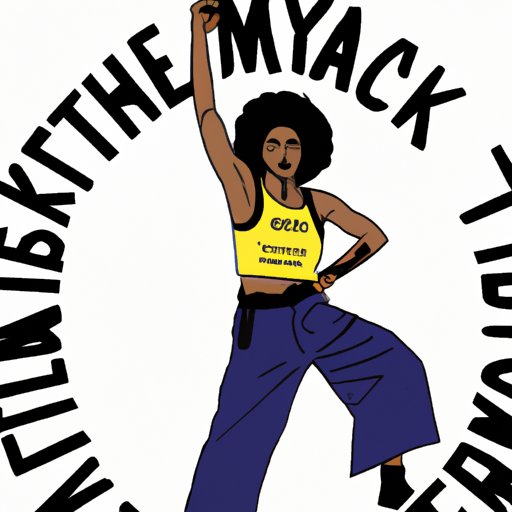Introduction
Woke culture has become increasingly popular in recent years, as more people are beginning to recognize the importance of social awareness and justice. But what exactly does it mean to be “woke”? In this article, we will explore the definition of woke culture and examine its origins, key terms and concepts, and impact on society. We will also compare and contrast woke culture with other social movements, investigate its political implications, and debunk some common myths about the concept.

Examining What it Means to be “Woke”
The term “woke” has been around for decades, but its usage has become more widespread in recent years. In its simplest form, being woke means being socially and politically aware and actively working towards social justice. It is an attitude of critical thinking and an understanding of how power dynamics can lead to oppression and inequality.
At its core, woke culture is based on the idea that all people should be treated equally, regardless of race, gender, class, religion, or any other factor. This includes recognizing systemic racism and other forms of discrimination, challenging oppressive beliefs and systems, and advocating for change. To be “woke” is to be conscious of the world around you and to strive to make it a better place.
There are several key terms and concepts associated with woke culture. These include intersectionality, which refers to the interconnected nature of various forms of oppression; privilege, which is the unearned advantages that some people have due to their identity; and ally-ship, which is the act of supporting marginalized groups.
Examples of woke behaviors include attending protests and rallies, speaking out against injustice, educating yourself about social issues, donating to causes, and engaging in meaningful conversations about race, gender, and other topics. It is also important to note that being woke is an ongoing process – it is not something that one can simply achieve and then stop. Woke culture is an ever-evolving movement that requires constant effort and dedication.
Investigating How Woke Culture Impacts Society
The impact of woke culture on society is both positive and negative. On the one hand, it encourages people to think critically about social issues and take action to create change. It has also raised awareness about systemic racism, sexism, and other forms of discrimination, leading to greater acceptance and inclusion of marginalized groups.
On the other hand, there are some potential downsides to woke culture. For example, it can be seen as divisive, as it often pits one group against another. It can also be exclusionary, as it can alienate those who do not share the same views or values. Additionally, some argue that woke culture can be overly sensitive and judgmental, and that it can lead to censorship and the silencing of dissenting voices.
Social media has played a major role in the rise of woke culture. Platforms such as Twitter and Instagram have given people a platform to express themselves and share their views on social issues. They have also made it easier to stay informed, organize protests and rallies, and spread awareness about injustices. However, it is important to remember that social media can also be used to spread misinformation and amplify hateful rhetoric.
Comparing and Contrasting Woke Culture with Other Social Movements
Woke culture is often compared to the Black Lives Matter Movement, as both are focused on addressing inequality and injustice. However, there are some key differences between the two. The Black Lives Matter Movement is primarily focused on fighting police brutality and racism, whereas woke culture encompasses a broader range of issues including sexism, homophobia, and economic inequality.
Woke culture is also often compared to environmental activism. While both movements are concerned with creating a better future, they differ in terms of their focus. Environmental activists are primarily concerned with protecting the planet and its resources, while woke culture is more focused on addressing social and political issues.
Analyzing the Impact of Woke Culture on Politics
The impact of woke culture on politics has been significant in recent years. It has encouraged people to become more engaged in the political process, and has led to an increase in voter turnout among young people. Woke culture has also had an influence on policy, with politicians taking a stand on issues such as racial justice and LGBTQ rights.
In the upcoming US presidential election, woke culture could potentially play a major role in determining the outcome. Many younger voters are likely to prioritize candidates who support progressive policies, such as ending mass incarceration and expanding access to healthcare. Furthermore, the increasing presence of woke culture on social media could help to mobilize voters and encourage them to cast their ballots.

Debunking Myths About Woke Culture
Despite its growing popularity, there are still many misconceptions about woke culture. One common myth is that it is only for privileged people, when in reality it is open to anyone who is willing to learn and take action. Another myth is that it is anti-police, when in fact it seeks to hold law enforcement accountable and ensure that everyone is treated fairly.
It is also important to note that being woke does not mean that one must agree with every aspect of the movement. Woke culture is about having an open mind and engaging in meaningful dialogue, not about blindly following a certain set of beliefs. It is about recognizing our collective responsibility to create a fairer and more equitable society.

Examining the Role of Technology in Woke Culture
Technology has played an important role in the development of woke culture. Social media has allowed people to connect with like-minded individuals, share ideas, and spread awareness about social issues. Technology has also enabled people to organize protests and rallies, and to quickly disseminate information about injustices.
However, there are also some potential dangers associated with technology and woke culture. For example, it can be easy to get caught up in online debates and lose sight of the bigger picture. Additionally, the proliferation of misinformation can lead to confusion and misunderstanding. It is important to remember that technology should be used as a tool to further the cause of social justice, not as a distraction.
Conclusion
In conclusion, woke culture has become an increasingly powerful force in recent years, and its impact on society and politics cannot be understated. It is based on the idea that all people should be treated equally, regardless of race, gender, class, or any other factor. It encourages critical thinking and action, and can lead to greater acceptance and inclusion of marginalized groups. Additionally, it has the potential to shape the outcome of elections and influence policy. Finally, it is important to keep in mind that there are some common misconceptions about woke culture, and it is important to recognize these and strive to educate ourselves and others.
(Note: Is this article not meeting your expectations? Do you have knowledge or insights to share? Unlock new opportunities and expand your reach by joining our authors team. Click Registration to join us and share your expertise with our readers.)
